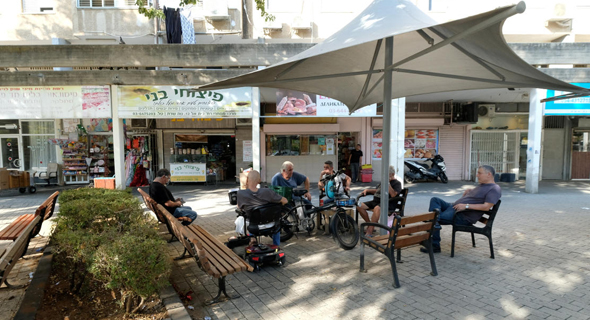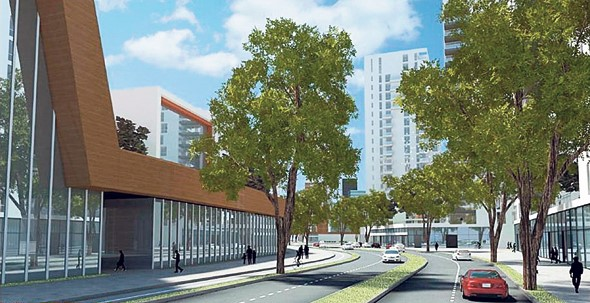Shlomit Tzur, calcalist.co.il
The evacuation plans, implemented in the residential sector, find it difficult to reach the commercial centers and shops. So far, such a project on the purity of the commercial territories has not yet been launched, and not for good reason - if in the residential areas the evacuation-demolition proceedings are barred, in these areas of trade there are several complexities. Still, the first swallow in the field is getting underway. Calcalist learned that in the Neve Sharet neighborhood of northern Tel Aviv, a plan is being taken to demolish an old commercial center and build a new center in its place.
Also, in the area of residential evacuation, Neve Sharet is considered a pioneer, since the first projects in Tel Aviv were promoted there. So far, three such projects have been populated in the neighborhood and more than 10 are being promoted. However, in the meantime, an old neighborhood commercial center is still being built, the extent of which does not cater to a growing population in the area following the revitalization of residential buildings. The shopping center now has 40 stores, and a plan for evacuation has already been presented in the Northern Planning Division of the Tel Aviv municipality. In the meantime, the shop owners are signing a lazy agreement and many barriers, but entrepreneurial company Ashley Lee-Ren, owned by Asher Alon and Ronnie Brick, is optimistic.
A drastic move
The commercial center at 12 Beit El Street in Neve Sharet spans 10 dunams of land. It is built in two rows of one-level shops and a 70-apartment residential building. It also includes an open public area and a parking lot on the ground floor. According to the plan being promoted on site, the stores and the residential building will be demolished, with 80 stores being set up on two levels and a new 20-story residential building with about 200 apartments. Parking will also be demolished in favor of empowering the public space that will include an urban square and an urban structure, and an underground car park will be erected beneath the public area. A number of alternatives have been submitted to the Northern Planning Team in the Tel Aviv Municipality, and the preferred alternative is expected to be discussed at the City Engineer's Forum.
 Commercial center in Neve Sharet neighborhood of Tel Aviv Photo: Shaul Golan
Commercial center in Neve Sharet neighborhood of Tel Aviv Photo: Shaul Golan
Architect Gil Ivory, the editor of the program, presented the difficulties of the procedure: "In Neve Sharet there are already three populated evacuation projects, during which hundreds of apartments were demolished and rebuilt.

Attorney Roy Shoval Photo: PR
On the other hand, it is much more difficult to demolish a commercial center, which is actually the heart of the neighborhood. In contrast to the new residential buildings scattered throughout the neighborhood, the commercial center remains as an old remnant that is not suitable for the revitalized neighborhood as well as the growing population.
"Dialogue with business owners is much more complex than apartment owners. In residential evacuation, a person vacates an apartment, gets a rental, and at the end of three years gets a new apartment. When there is an active shop it is very difficult to tell the business owner to leave the store and move to another store, in another area. Drastic, with so much to earn a living, surely if it is a neighborhood store that provides service to the population, sometimes 30 years, like a supermarket or hairdresser. The dialogue with a store is not only about the store space as in a residential apartment, but also about the profitability and continuity of the store's operations, Because business continuity cannot be disrupted, trade continuity is critical to a neighborhood business, so the value proposition must be quality and reflect Expectations not just in terms of space. "
Haim Xanthini, who has a mini-market with a life in the shopping center, who signed an evacuation agreement, told Calcalist: "The store is already small, and the center is old. Every winter there is flooding and all the infrastructure here is old. The other store owners need to wake up because the situation here is only going to get worse. The problem is I can't even close the store for a day. If I turn the store into a temporary building only during construction until the new permanent store, and I make the move at night, and in the morning already opens the temporary place. I cannot close an active mini market even for the day. " According to the plan promoted by the entrepreneurs, stores that find it very difficult to stop operations will be offered two routes: evacuation of a temporary structure to be built in the vacant areas; Or evacuation - which means the new stores will be built before the old stores are demolished. This solution requires the approval of the Tel Aviv municipality, and will be implemented in the BMA, which will soon be submitted to the local planning and construction committee.
According to Ivory Architect, the new stores will be set up on two levels and will include high ceilings and large fronts, unlike existing ones. "Instead of parking there will be an urban plaza with a new, high-quality public urban structure that will bring life to the entire neighborhood with the aim of maintaining its location as a neighborhood activity hub," said Shenhav. "Since the population of the neighborhood will almost triple itself when all the evacuation projects are implemented in the neighborhood, a strong public urban center is needed. The parking itself will become underground, and all the unloading, loading and dumping will be underground."
 Simulating the project in the Kiryat Moshe neighborhood on the streets of Hadania: Bar Levi Office of Architects and Town Planners
Simulating the project in the Kiryat Moshe neighborhood on the streets of Hadania: Bar Levi Office of Architects and Town Planners
East of the shopping center there is an extensive green public area, the largest in the neighborhood, which is topographically at a higher level than the ground. Part of the design challenge of the project is to connect the shopping center with the garden and make them accessible to each other. "We are first planning a public space, which includes a connection between the town square and the public park which is three meters above it,"
 Asher Alon, Project Projects in Neve Sharet
Asher Alon, Project Projects in Neve Sharet
Ivory explained. "We have presented to the municipality a number of alternatives to liaison, one of which the public building will serve as an intermediary, and those who pass it can rise to the garden level and upside down."
Asher Alon, co-owner of Ashley-Lee Ran, who is promoting the project: "The project is exceptional and our request from the municipality is to give the project a top priority, after we have completed several residential evacuation projects in the neighborhood and it is the turn of the commercial center. Submitting an alternative that is acceptable to both the developers and the tenants. "
According to Attorney Roy Shoval of Shoval Yoshua Office, which represents shop owners in the Neve Sharet shopping center, an entrepreneur needs to understand that in negotiations with shop owners, every business is a complete world, and the variance is much greater than that of apartment owners: Commercial, stores or parking lots require a different approach and creative solutions. ”When it comes to shops, a store that is also a source of income and occupation of the property owner must be distinguished from a store whose owner rents it, and the owner who runs the shop and makes a living cannot always rent an alternative place and keep working. A neighborhood book, for example, cannot copy the activity because its customers are local, and the activity from its own These businesses are not based on a Google search, so one of the challenges is to find a suitable compensation mechanism and determine what compensation will be provided, whether by the value of the asset, by the monthly profit or other compensation formula that will be determined by unique characteristics of the property. And of the project. "
Advocate Shoval adds that in the case of leased stores, if it is a shop where the renters exchange for relatively short periods, they can be compensated for the payment of rents. The problem is in many cases that there are long-term rental agreements compared to residential apartments: "Five-year plus five rental agreements or ten years in a commercial property is a very acceptable thing. "
Shoval also explains that unlike residential apartments, commercial property owners are less intrinsic to the renovation and renovation element, as they do not live on a property that is usually on the ground floor. In contrast, "it is important for them to increase the area, upgrade the commercial center's appearance, and obtain storage and parking solutions." According to him, what led to the agreement of shopkeepers at the Neve Sharet shopping center is the commitment of the construction evacuation, which means that all new stores will be built beforehand, so that the evacuated businesses can start operating without compromising the continuity of work. "Of course, this is not possible in the entire project, and we find other solutions," says Shoval, adding that even those who move immediately are still entitled to compensation for damage to their businesses during construction in the area: "We also succeeded in obtaining a compensation commitment and the developer's consent to make perfect adjustments for all those in need of care. Special".
The objections were accepted
Another neighborhood that includes small businesses and is at the beginning of the evacuation process is Kiryat Moshe on the streets. According to Attorney Zvi Caspi, a founding partner at Gindi Caspi, who recently represented the business owners there - the planning institutions must understand that the issue of business payoffs should be different from the payoffs for residential apartments.
The evacuation process for the neighborhood was recently approved by the USSR (National Commission for Planning and Construction of Preferred Housing Complexes). Prior to the approval, business owners objected to the USSR on the grounds that "the program has endangered the existence of active businesses for many years, some of which have earned a good reputation and A livelihood for many families, during its execution without producing an alternate area. Evacuating opponents and eliminating their current businesses and returning them only after the new construction will constitute an economic death blow for them. "
The objection also states that besides increasing the rights, as in the residential apartments, the plan to allocate available land for copying the business when building the project: "This will allow the existing businesses to continue operating in the middle stage as well. A new plan for the neighborhood cannot be easily erased and destroyed at a lifetime. As part of the planning considerations, existing business and real value should be taken into account as active businesses. "
Following discussion of the objections, changes were made to the plan, and the opponents were given a significant addition of building rights. "The USSR was open to hearing, listening, and fixing the plan," Caspi says. "The plan was initially ignored by business owners, but slowly we formulated a much more economic plan together. The rights have grown significantly, an increase of hundreds of percent compared to the original plan. The WMA and planning committees must be open to finding the right solutions for business owners, even in programs where it is difficult to create a continuum of business for those businesses. "



